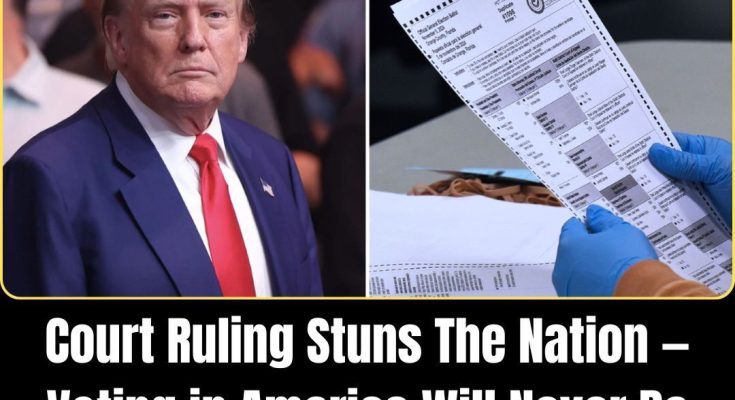
Texas can require people applying to vote by mail to submit identification numbers that match state records, a federal appeals court ruled.
The Fifth Circuit Court of Appeals sided with the state in a legal battle brought by the Biden administration and several voting rights groups.
A three-judge panel found the ID match system is a valid way to prevent fraud and confirmed that it does not violate the Civil Rights Act. The court said the law is “obviously designed to confirm that every mail-in voter is indeed who he claims he is.”
Judge James Ho wrote the opinion, reversing a lower court decision from November 2023 that had struck down the number match requirement.
That lower court had argued the match was not material in determining voter eligibility. But the Fifth Circuit disagreed, saying it had “no difficulty” concluding that the law is compliant. The ruling lifts the prior injunction that had been paused by the court in December 2023.
The ID requirement is part of S.B. 1, a wide-ranging election law passed by Texas Republicans in 2021 in the wake of the 2020 election.
Democrats and activists claim the law unfairly blocks eligible voters from casting ballots.
The Biden Justice Department argued the state’s database system is unreliable and leads to wrongful ballot rejections.
One filing showed that more than 60,000 voter records had mismatched ID numbers as of January 2023.
Still, the judges appeared unconvinced during oral arguments in February and did not ask a single question of the Texas attorney general’s lawyer.
Judge Patrick Higginbotham and Judge Don Willett joined Ho’s decision.
The plaintiffs were represented by the American Civil Liberties Union Foundation, ACLU of Texas, Disability Rights Texas, Texas Civil Rights Project, the Department of Justice, and the Democratic National Committee.
Defendants included the Texas Attorney General’s Office, the America First Policy Institute, and the law firm Jones Day.
The case is United States v. Paxton, 5th Cir., No. 23-50885, decided August 4, 2025.
The decision came the same day Texas Attorney General Ken Paxton backed a resolution passed by the Texas House that calls for the arrest of Democrat lawmakers who are absent from the Capitol.
This comes as Democrats are suffering massively in polling.
A new national poll shows that most Democrats are dissatisfied with how their party’s lawmakers are performing in Congress.
According to a Quinnipiac University survey released Wednesday, 53% of Democratic respondents disapproved of congressional Democrats’ job performance, while only 41% expressed approval.
Among all voters surveyed between June 5–8, just 21% approved of how Democrats in Congress are handling their roles, with 70% voicing disapproval.
The 21% approval rating matches the figure from Quinnipiac’s February national poll, tying “an all-time low since Quinnipiac University first asked this question of registered voters in March 2009.”
In contrast, the survey shows that 79% of Republican voters approve of how congressional Republicans are performing, while 13% disapprove, Fox News reported, citing the survey’s results.
Among all voters, 32% approved of the job performance of congressional Republicans, while just over 60% expressed disapproval.
Overall approval for Republicans in Congress has declined by eight points since Quinnipiac’s February poll, with disapproval rising by nine points over the same period.
The Democratic Party has been in a state of political disarray since the November elections, when Republicans regained control of the White House and the Senate while holding on to their narrow majority in the House. Adding to the setback, Republicans made inroads with key Democratic constituencies, including black, Hispanic, and younger voters.
Since President Donald Trump’s return to office earlier this year, an increasingly energized Democratic base has been pressuring party leaders to take a more forceful stance against the president’s sweeping and controversial agenda during the early months of his second term. Frustration is not only aimed at Republicans, but also at fellow Democrats who are seen as too passive in their opposition.
This growing dissatisfaction has contributed to a sharp decline in the Democratic Party’s favorability ratings, which have reached historic lows in multiple polls over the past several months.

